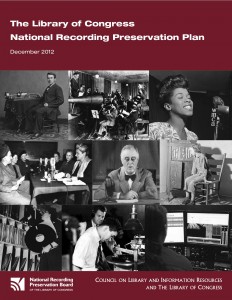By Kelly Hangauer
Back again with The Library of Congress National Recording Preservation Plan discussed in the last post. When I read through this information the first time, I marked ideas or “recommendations” made by the authors that caught my attention. I was struck by the fact that the Library of Congress has nearly “3.5 million recordings that embody more than 120 years of audio history.” What the authors suggest though, is that the digitized audio is not reaching enough researchers. In order to make these recordings more accessible, a centralized network is needed.
As an independent musician, I thought it was especially interesting how the Library of Congress recognized the realities of independent musicians today. The writers illustrate the fact that artists are tending to not copyright their music, and are oftentimes not manufacturing hard copies of the music. More and more, music is disseminated online through the channels of BandCamp, Soundcloud, and Spotify. The Library of Congress personnel who authored the National Recording Preservation Plan suggest that the Library of Congress should form working relationships with record labels and other music industries to ensure that engineers are recording music in such a way that it can be preserved. Considering the amount of music out there, a multilateral approach is needed.
Now, you may ask, how does one preserve audio? Well the answer is complex but essentially it entails creating a digital file from a record, reel-to-reel, tape, CD, or any other format of sound. The digitization process involves a set of best practices and standardizations one should adhere to in order that the digital file be as sturdy as possible. Once the archival digital file is created, upkeep from archivists is necessary to ensure its longevity.
If you are interested in learning more about this, go ahead and download The Library of Congress National Recording Preservation Plan.

